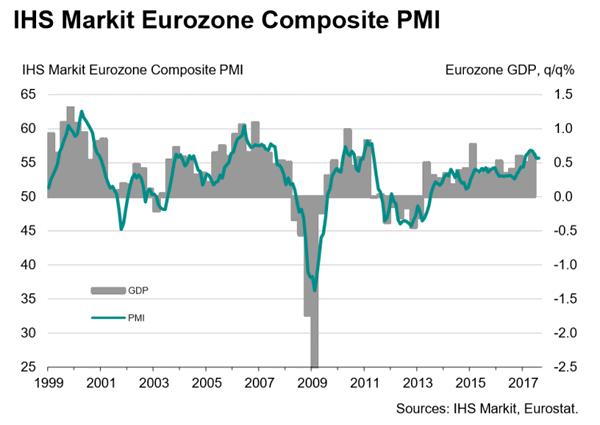Today’s evidence of Eurozone’s economic activity and consumption will sound good news to ECB policymaker’s ears on Thursday when they will gather to decide on monetary policy in Frankfurt. Despite overall economic activity slowing down in August and retail sales declining in the same period, their levels remained robust, supporting GDP growth in the third quarter of the year. In the wake of the data, the euro reacted negatively while it was trying to build an uptrend.
Following upbeat manufacturing PMI results out of the Eurozone last Friday which showed that the manufacturing PMI remained at six-year high levels in August, the service PMI index for the same month, released during European trading hours, came in slightly lower than expected. However, the performance of the services sector held strong as it was comparable to the ones seen prior the recent financial crisis in the region. According to IHS Markit, service PMI in the block retreated by 0.7 points to a seven month low of 54.7 in August, missing the forecast of 54.9. Overall, the composite PMI for the region which summarizes manufacturing and service activities, fell moderately by 0.1 points to 55.7, below the 55.8 expected.
Inflow of new business was mainly observed in the service sector while job growth and rising prices were the main supporters of the composite index. The flow of new business remained above its long-run trend despite it fell to a seven-month low while jobs grew slower but continued expanding for the fourth consecutive month. Output charges and Input costs rose in August, hitting three-month highs. Nevertheless, inflation slowed down from previous peaks posted in the year. Companies optimism eased to the lowest year-to-date mark after it touched a record high in May.
Among the five European countries participating in the survey, Germany and Ireland registered the highest outputs. While Germany experienced the highest increase in production volumes since 2011, it posted the lowest growth in service activities among other participants. Ireland saw an improvement in both manufacturing and service activities.
Regarding Eurozone consumption, it turned negative in July after six months of rising higher. Month-on-month retail sales declined by 0.3% while analysts expected a fall of 0.2%. June’s mark was revised from a positive 0.5% to a positive 0.6%. On a yearly basis, retail sales expanded by 2.6%, surpassing the forecast of 2.5% but scaled back from June’s reading of 3.3% which was upwardly revised from 3.1%. July’s mark was the second best registered during the year.
Although the above numbers highlight the block’s resilience to economic shocks, the ECB is said to maintain its current monetary policy steady at its meeting on Thursday in Frankfurt, as several ECB officials expressed their concerns over an appreciating exchange rate. However, this might increase the odds of stimulus reduction in 2018 – with the announcement probably made at October’s meeting – given that economic indicators would support such actions by the ECB. Despite inflation lagging the target of 2%, the central bank signaled in July that it would probably announce a reduction in its asset purchases – known as quantitative easing program – "this autumn" before the program expires in November, as GDP growth follows a solid path year to date.
In the forex markets, euro/dollar fell immediately by 0.30% to 1.1867 in the wake of the news but managed to recover soon after, climbing to 1.1894. Euro/yen did not react much to the data but dropped to a one-week low of 129.87 amid rising risk-off sentiment in the markets while euro/pound retreated by 0.27% to 0.9180 following the figures before it headed downwards to 0.9157 due to option expiries.

